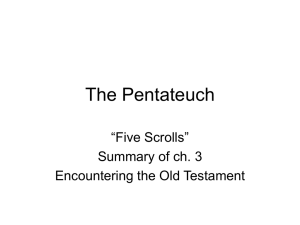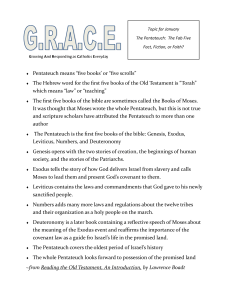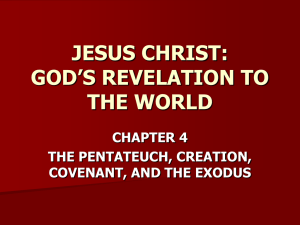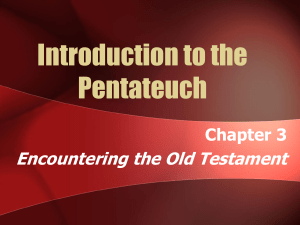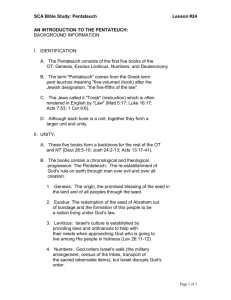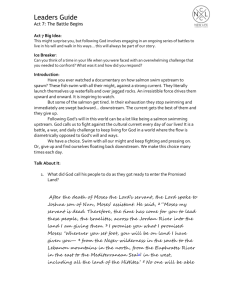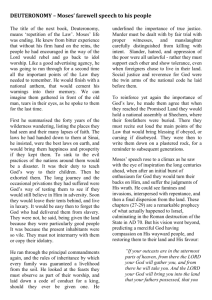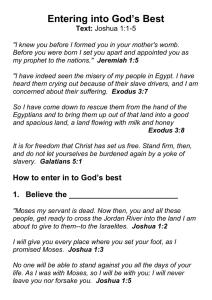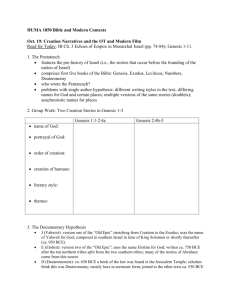Introduction to the Pentateuch and Historical Books
advertisement
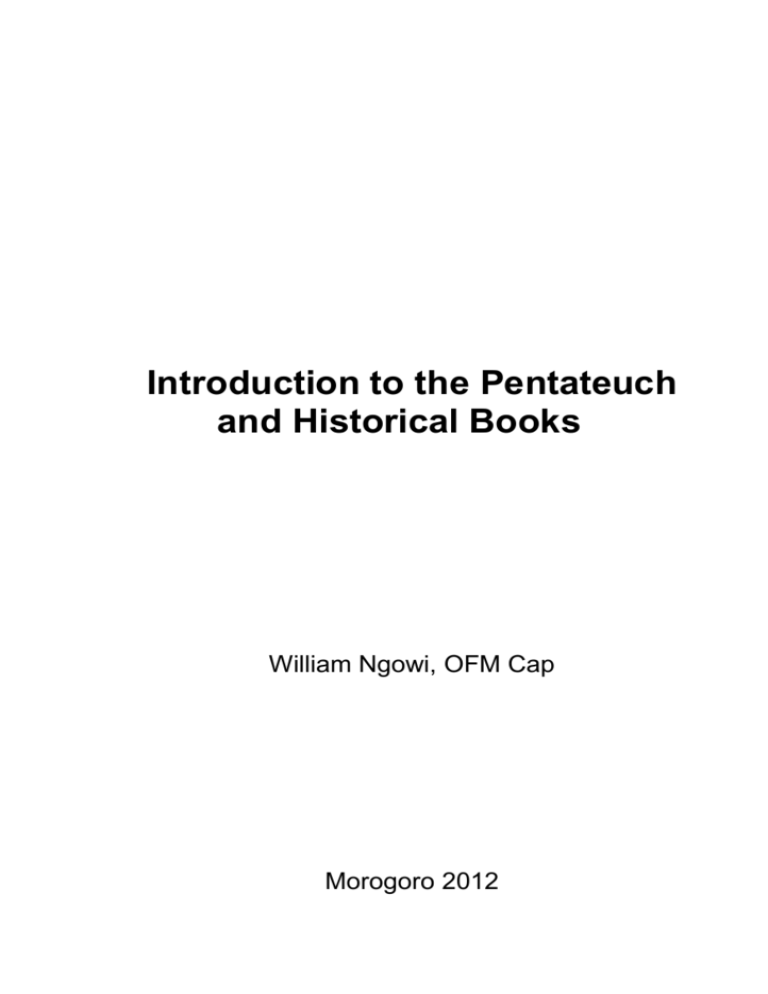
Introduction to the Pentateuch and Historical Books William Ngowi, OFM Cap Morogoro 2012 Introduction to the Pentateuch and Historical Books Published by SALVATORIANUM Year of Publication: 2012 ISBN 978-9987-645-30-5 Cover design: Bernard Witek Jordan University College P. O. Box 1878 Morogoro – Tanzania Tel.: +255 23 2604854 E-mail: Web: jordanunivcollege@yahoo.com www.morogoro.sds.org facebook.com/jordanmorogoro Table of Contents Introduction ................................................................................................. 5 PART ONE: THE PENTATEUCH ........................................................... 7 1.1 The Source and Redaction Criticism of the Pentateuch ..................... 13 1.1.1 Literary Problems in the Pentateuch ............................................ 13 1.1.2 Source and Redaction Criticism .................................................. 14 1.1.3 The Priestly Document (P) is Exilic or Early Post Exilic Period . 15 1.1.4 The Yahwist Document (J) .......................................................... 17 1.1.5 The Elohist Document (E) ........................................................... 20 1.1.6 The Deuteronomist Document (D) .............................................. 22 1.1.7 Conclusive Remarks of the Documentary Sources ...................... 22 1.1.8 Basic Laws Underlying the Documentary Theory....................... 24 1.1.9 Criticism of the Documentary Theory by Modern Critics ........... 38 1.2 Main Literary Genres in the Pentateuch and Historical Books .......... 40 1.2.1 Definition of Narrative Genre ...................................................... 40 1.2.2 The Legal Genre .......................................................................... 41 1.2.3 Excursus: The Decalogue – Ten Commandments ....................... 45 1.2.4 Excursus: The Background of Covenant Theology ..................... 50 1.3 Division and Structure of the Pentateuch ........................................... 52 1.4 The Book of Genesis .......................................................................... 53 1.4.1 Content Outline............................................................................ 55 1.4.2 Exposition .................................................................................... 57 1.4.3 Exegesis of Selected Texts: Gen 1–3 ........................................... 57 1.5 The Book of Exodus .......................................................................... 84 1.5.1 Content Outline............................................................................ 84 1.5.2 Exposition .................................................................................... 86 1.5.3 Theology ...................................................................................... 89 1.6 The Book of Leviticus........................................................................ 90 1.6.1 Content Outline............................................................................ 90 1.6.2 Exposition .................................................................................... 92 1.6.3 Theology ...................................................................................... 95 1.7 The Book of Numbers ........................................................................ 95 1.7.1 Structure ...................................................................................... 95 1.7.2 Content Outline............................................................................ 97 1.7.3 Exposition .................................................................................... 97 1.7.4 Theology .................................................................................... 102 1.8 The Book of Deuteronomy .............................................................. 102 1.8.1 Content Outline.......................................................................... 103 1.8.2 Exposition .................................................................................. 105 1.8.3 Theology .................................................................................... 108 4 W. Ngowi – The Pentateuch and Historical Books 1.8.4 Conclusion ................................................................................. 111 1.9 Summary of the Theology of the Pentateuch ................................... 111 PART TWO: THE HISTORICAL BOOKS ......................................... 117 2.1 Excursus: The Main Features of Deuteronomistic History .............. 117 2.2 The Book of Joshua ......................................................................... 119 2.2.1 Content Outline ......................................................................... 121 2.2.2 Exposition ................................................................................. 122 2.2.3 Theology ................................................................................... 125 2.3 The Book of Judges ......................................................................... 127 2.3.1 Composition of the Book .......................................................... 128 2.3.2 Content Outline ......................................................................... 128 2.3.3 Exposition ................................................................................. 129 2.3.4 Theology ................................................................................... 133 Conclusion .................................................................................... 134 2.4 The First and Second Book of Samuel ............................................ 134 2.4.1 Content Outline ......................................................................... 135 2.4.2 Exposition of 1 Samuel ............................................................. 136 2.4.3 2Sam 1:1–24:25......................................................................... 137 2.4.4 Exposition of 2 Samuel ............................................................. 139 2.4.5 Theology of 1 and 2 Samuel...................................................... 140 2.5 The First and Second Book of Kings ............................................... 144 2.5.1 Content Outline of First Kings .................................................. 144 2.5.2 Content Outline of Second Kings .............................................. 146 2.5.3 Exposition of 1 & 2 Kings ......................................................... 148 2.5.4 Theology of 1 & 2 Kings ........................................................... 150 Conclusion .................................................................................... 151 2.6 Summary of the Theology of the Historical Books ......................... 152 2.7 Chronological Table of the Kings of Israel and Judah ..................... 152 Bibliography ............................................................................................ 155 Index of Topics ........................................................................................ 159 Biblical Index ........................................................................................... 161 Introduction This book is the product of teaching for several years a course on an introduction to the Pentateuch and the Historical Books of the Bible at the Jordan University College. The study covers almost one quarter of the Old Testament, i.e. the five books of the Pentateuch: Genesis, Exodus, Leviticus, Numbers and Deuteronomy. This is followed by the six Historical books: Joshua, Judges, 1 and 2 Samuel, and 1 and 2 Kings. Because of the importance of these books in both Jewish and Christian theology, the study lays a foundation for the study of the Old Testament. It is not a commentary on these books; rather it introduces the reader to the most important and essential aspects for the proper understanding of this part of the sacred Scripture. I hope, therefore, that theology students will find it helpful for their biblical studies. The study elucidates and discusses key issues that have been raised by scholarship in the Pentateuchal and Historical Books, such as: historical, structural, semantic, narrative, redactive, and source criticism. The book then provides a summary of the theology of each of the books dealt with here. It also contains an exegetical and theological analysis of Genesis 1 - 3 as an example for students. It also attempts to indicate the contemporary state of scholarship for this part of the Holy Bible. Since many questions are raised by the study, serious readers and exegetes are invited to continue to advance the scholarship. The sheer number, literary genres, and theological diversity of the books demands that the study be divided into two parts: first, the Pentateuch and, second, the Historical books. Each book is treated from four different perspectives: its compositional structure, its literary genre, a brief exposition of its content, and a short discussion of its main theological themes. Finally, I am indebted to Rev. Dr. Bernard Witek, SDS, the Principal of Jordan University College, who patiently edited the work and wonderfully designed the book cover. I also thank my theology students whose relevant and information seeking questions prompted me to write the book for all those who may be interested in reading this part of the Holy Bible in an informed manner. The rich 6 W. Ngowi – The Pentateuch and Historical Books bibliography at the end of the book is intended to provide further reading for all those who are interested in serious and detailed treatment of the pertinent literary and theological themes in these books. William Ngowi, OFMCap Jordan University College Morogoro October 2012 PART ONE THE PENTATEUCH Introduction The name Pentateuch is a composite Greek word Pentateuchos deriving from pe,nte (pente, “five”) and teu,coj (teuchos, “vessel”, “receiver”, “container” or “instrument”). The word teuchos gradually came to be understood as “scroll”. The Pentateuch contains the first five books or scroll of the Hebrew Bible (Genesis, Exodus, Leviticus, Numbers and Deuteronomy), thus the Greek word pente. These five books are known in Hebrew as hamisha humshe hattora – “the five fifth of the Torah or the fivefold Torah”.1 The names of the five books derive from the LXX and taken over by the Vulgate. The Hebrew titles of the books derive from the key word in the first verse of the book: • Genesis is known as the “Beginning” (tyviareB., berē’shît, Gen 1:1); • Exodus is known as the “Names” (tAmv., shemôt, Ex 1:1); • Leviticus is known as “And He Called” (ar'q.YIw:, wayyiqrā’, Lev 1:1); • Numbers is known as “In the Wilderness” (rB;d>miB., bemidbar, Num 1:1); • Deuteronomy is known as the “Words” (~yrIb'D>h;, haddebārîm, Deut 1:1). 1 The word “Torah” derives from the Hebrew verb hry, yarah, “to instruct or teach”. Hence the Torah for the Jews is not simply the modern understanding of Law; rather, it has the wider sense of “instruction or teaching”. It seems the Israelites divided the narrative into five books or scrolls just as they did with the Psalms. Also practically five scrolls would have been easier to carry around since one whole skin parchment would have been too heavy. See G.J. WENHAM, Exploring the Old Testament, I: A Guide to the Pentateuch, Downers Grove, IL: InterVarsity, 2003, 4-6; J. BLENKINSOPP, “Introduction to the Pentateuch”, in The New Interpreter’s Bible, I, 305-318. 8 W. Ngowi – The Pentateuch and Historical Books The Pentateuch is known as the Torah in Jewish tradition in contradistinction from the other Hebrew Biblical books, such as the Historical (Joshua, Judges, 1-2 Samuel, 1-2 Kings, 1-2 Chronicles, Ezra and Nehemiah) and Prophetic ones. The book of Deuteronomy is sometimes known in Patristic writings as Protrectic or “Exhortation”, a title which is proper for its content. The book is also known in Jewish tradition as “the copy of the Law” (hr'ATh; hnEv.mi, mishnēh hattôrâ) from Deut 17:18, which the king was supposed to read every day. The normal translation of the expression would be deuteros nomos and not the Septuagint translation as deuteronomion. There are various positions as to what makes the Pentateuch: • Some authors, like G. von Rad, have proposed the name Hexateuch – “six scrolls”, suggesting the inclusion of the Book of Joshua. The rationale is that the fulfilment of the whole story of Israel’s origin was the acquisition of the Promised Land, which is narrated Joshua. Therefore, the short historical creed of Israel found in Deut 6:21-23 and 26:5-9 is repeated in Josh 24:2-13, concluding it with the mentioning the gift of the Promised Land. • Another suggestion came from Martin Noth who spoke of Tetrateuch – “four scrolls”, and excluded the book of Deuteronomy from the Pentateuch. He found no deuteronomistic material in Genesis – Numbers. Therefore there was no connection between Genesis – Numbers and Deuteronomy. He refuted the previous proposal of G. von Rad because the major sources of the Pentateuch: J (Yahwist), E (Elohist), P (Priestly) and D (Deuteronomist) are not present in the book of Joshua. Instead he regarded the book of Deuteronomy as the preface for the deuteronomistic history in Joshua to 2 Kings. The story of Israel in Deut 1–3 which already known in the book of Numbers makes no sense if it is not understood as the beginning of a new level of Israel’s history that would unravel in Josh–2Kgs. Joshua can only conquer the Promised Land if he remains faithful to the Law of Moses (Josh 1:7-8; 23:6). And when Israel became Part One: The Pentateuch 9 unfaithful she was punished with the loss of the Promised Land (2Kgs 17:7-23). In short, the deuteronomistic history is the story of Israel’s faithfulness and unfaithfulness to the Law of Moses. The first four books (Gen–Num) was the work of the Priestly scribes who collected material from oral traditions, while the book of Deuteronomy was the work of Deuteronomistic scribes. • Others suggested the term Enneateuch – nine scrolls: which included all the books from Genesis to 2 Kings. They understood the block as beginning from Creation to the Babylonian Exile. The main motif of the story is the Promised Land: o YHWH promised the Land to the Patriarchs (Gen), o Israel sojourned toward it in the desert (Ex–Num), o Joshua conquered it (Josh), o Judges defended it (Jdg), o The kings made it a kingdom (1-2Sam–1-2Kgs), first a united kingdom and later a divided one (the Northern and the Southern kingdom), o Finally, Israel lost its Promised Land and the destruction of the Temple by being exiled to Babylon. The books of Genesis–2 Kings narrate the “principle history” of Israel, while 1-2 Chronicles and Ezra and Nehemiah are in the Writings Part of the Hebrew Bible for they give the “secondary history”, which account the postexilic events, i.e. the return from the Babylonian Exile and the reconstruction of the Temple. • The use of Pentateuch in the canon of the Hebrew Bible is based on various reasons: o Deut 34:10-12 gives the most fundamental demarcation for the Pentateuch, for it specifically puts Moses above any other prophetic figure in Israel’s history. o And Moses’ Law is superior to all legislations because of its relation with YHWH (cf. Ex 33:11; Num 12:6-8. Moses had direct contact with YHWH without intermediary or schemes like visions or dreams (Num 12:6-8). 10 W. Ngowi – The Pentateuch and Historical Books o The Exodus is the most important event in Israel’s history, and no other event can be compared to it. Therefore, the foundation of Israel goes back to Moses, and not to David or Solomon. The importance of Moses is demonstrated in the other parts of the Hebrew Bible as witnessed by the following texts: A. The second part of the Hebrew Bible which contains the Earlier 2 Prophets in the Historical Books and Later Prophets, both Major and Minor Prophets (~yaiybin>) 1. In Josh 1:1-8 we get four pieces of information: a. Joshua is the successor of Moses, and his task is to conquer the Promised Land and distribute the land to the fathers. b. Moses is the servant of YHWH (hw"hy> db,[,ä, ‘ebed YHWH); Joshua is given another title as the minister of Moses (hv,mo trev'm., meshāret Mosheh). In other words, Moses is described by his relationship with YHWH, while Joshua is described by his relationship with Moses. Therefore, the book of Joshua deals with another level of revelation and relationship with YHWH. Joshua does not the place of Moses as the “Servant of YHWH”. c. There is continuity from Moses to Joshua: Joshua will be to Moses just as Moses was to YHWH (Josh 1:5). God will fulfil the promise he made to Moses by giving the land to Israel (Josh 1:3), which means that the foundation of the history of Israel is Moses, and not Joshua. d. The success of Joshua would depend on his faithfulness to the Law of Moses (Josh 1:7-8). The law was written on a book, and become the cornerstone for any of Israel’s undertakings. The history of Israel would subsequently be the story of their faithfulness or unfaithfulness to the Law of Moses. 2 Earlier or Former Prophets are found in the Historical Books, and they do not have their own writings, while the Later Prophets, both Major and Minor have their own writings.
